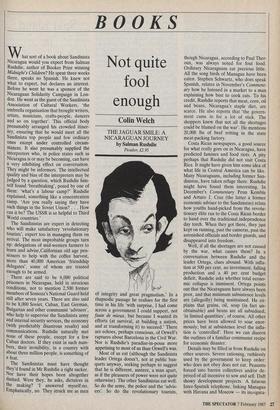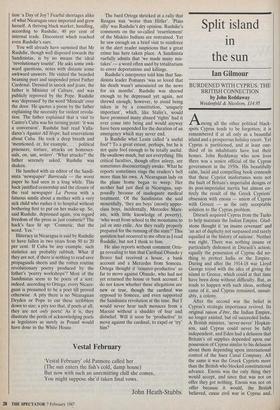BOOKS
Not quite fool enough
Colin Welch
THE JAGUAR SMILE: A NICARAGUAN JOURNEY by Salman Rushdie Picador, f2.95 What sort of a book about Sandinista Nicaragua would you expect from Salman Rushdie, author of Booker Prize winning Midnight's Children? He spent three weeks there, speaks no Spanish. He knew not what to expect, but declares an interest. Before he went he was a sponsor of the Nicaraguan Solidarity Campaign in Lon- don. He went as the guest of the Sandinista Association of Cultural Workers, 'the umbrella organisation that brought writers, artists, musicians, crafts-people, dancers and so on together'. This official body presumably arranged his crowded itiner- ary, ensuring that he would meet all the Sandinista top people and few ordinary ones except under controlled circum- stances. It also presumably supplied the interpreters who, in police states such as Nicaragua is or may be becoming, can have a very inhibiting effect on conversation. They might be informers. The intellectual quality and bias of the interpreters may be judged by a question, which Rushdie him- self found 'breathtaking', posed by one of them: 'what's a labour camp?' Rushdie explained, something like a concentration camp. 'Are you really saying they have such things in the Soviet Union? . . . How can it be? The USSR is so helpful to Third World countries.'
The Sandinistas are expert in detecting who will make satisfactory 'revolutionary tourists', expert too in managing them on arrival. The most improbable groups turn up: delegations of mid-western farmers to learn and advise,Californian old age pen- sioners to help with the coffee harvest, more than 40,000 American 'friendship delegates', some of whom are trusted enough to be armed.
There are said to be 6,000 political prisoners in Nicaragua, held in atrocious conditions, not to mention 2,500 former members of Somoza's National Guard held still after seven years. There are also said to be 8,000 Soviet, Cuban, East German, Bulgarian and other communist 'advisers', who help to supervise the Sandinista army and internal security services, the economy (with predictably disastrous results) and Communications. Rushdie naturally met none of these people, except for a few Cuban doctors. If they exist in such num- bers, their invisibility, in a country with about three million people, is something of a feat.
The Sandinistas must have thought they'd found in Mr Rushdie a right sucker. Nor have their hopes been altogether dashed. Were they, he asks, dictators in the making? 'I answered myself:no. Emphatically, no. They struck me as men of integrity and great pragmatism.' In a rhapsodic passage he realises for the first time in his life 'with surprise, I had come across a government I could support, not faute de mieux, but because I wanted its efforts (at survival, at building a nation, and at transforming it) to succeed.' There are echoes, perhaps conscious, of Orwell's raptures about Barcelona in the Civil War. Nor is Rushdie's paradise-in-posse more appetising to most of us than Orwell's was.
Most of us eat (although the Sandinista leader Ortega doesn't, not at public ban- quets anyway, seeking perhaps to suggest that he is different, austere, a man apart, as if the pleasures of power were not quite otherwise). The other Sandinistas eat well. So do the army, the police and the 'advis- ers'. So do the revolutionary tourists, though Nicaragua, according to Paul Ther- oux, was always noted for foul food. Ordinary Nicaraguans eat precious little. All the song birds of Managua have been eaten. Stephen Schwartz, who does speak Spanish, relates in November's Comment- ary how he listened in a market to a man explaining how best to cook cats. To his credit, Rushdie reports that meat, corn, oil and beans, Nicaragua's staple diet, are scarce. He also reports that 'the govern- ment came in for a lot of stick. The shoppers knew that not all the shortages could be blamed on the war'. He mentions 20,000 lbs of beef rotting in the state meat-packing factory.
Costa Rican newspapers, a good source for what really goes on in Nicaragua, have predicted famines and food riots. A pity perhaps that Rushdie did not visit Costa Rica. It might have given him some idea of what life in Central America can be like. Many Nicaraguans, including former San- dinistas, have taken refuge there. Rushdie might have found them interesting. In December's Commentary Penn Kemble and Arturo J. Cruz (the latter a former economic adviser to the Sandinistas) relate how youths hand-picked from the revolu- tionary elite ran to the Costa Rican border to hand over the traditional independence day torch. When they got there, they just kept on running, past the cameras, past the astonished officials and border guards, and disappeared into freedom.
Well, if all the shortages are not caused by the war, what causes them? In a conversation between Rushdie and the leader Ortega, clues abound. With infla- tion at 500 per cent, no investment, falling production and a 40 per cent budget deficit, Rushdie asks whether total econo- mic collapse is imminent. Ortega points out that the Nicaraguans have always been poor, and that minimum subsistence levels are (allegedly) being maintained. He ex- plains that grains, oil, soap (in fact un- obtainable) and beans are all subsidised, 'in limited quantities', of course. All other prices have been allowed to soar enor- mously; but at subsistence level the infla- tion is 'controlled'. Here we can discern the outlines of a familiar communist recipe for economic disaster.
Details may be filled in from Rushdie on other sources. Severe rationing, ruthlessly used by the government to keep order: who does not obey does not eat. Peasants forced into barren collectives and/or de- prived of all incentive to sow and sell. Daft showy development projects. A fatuous Inter-Sputnik telephone, linking Managua with Havana and Moscow — its inaligura- tion 'a Day of Joy'! Fearful shortages alike of what Nicaragua once imported and grew herself. A thriving black market, handling, according to Rushdie, 40 per cent of internal trade. Discontent which reached even Rushdie's ears.
You will already have surmised that Mr Rushdie, though well disposed towards the Sandinistas, is by no means the ideal `revolutionary tourist'. He asks some awk- ward questions, notes with distaste some awkward answers. He visited the bearded beaming poet and suspended priest Father Cardenal. Dressed in smock and jeans, the father is Minister of Culture, and was publicly reproved by the Pope. Rushdie was 'depressed' by the word `Minicult' over the door. He quotes a poem by the father explaining the necessity for violent revolu- tion. The father explained that a visit to Castro's Cuba was his turning point: 'it was a conversion'. Rushdie had read Valla- dares's Against All Hope, had reservations about Cuba. He took a deep breath and `mentioned, er, for example, . . . political prisoners, torture, attacks on homosex- uals, on, urn, writers'. 'What attacks?' the father serenely asked. Rushdie was shaken.
He lunched with an editor of the Sandi- nista 'newspaper' Barricada — the worst paper he had seen in a long while. This hack justified censorship and the closure of the real newspaper La Prensa with a fatuous simile about a mother with a very sick child who rushes it to hospital without bothering first to put on her make-up. So, said Rushdie, depressed again, you regard freedom of the press as just cosmetic? The hack's face lit up: 'Cosmetic, that the word. Yes.'
Illiteracy in Nicaragua is said by Rushdie• to have fallen in two years from 50 to 20 per cent. If Cuba be any example, such statistics are probably rubbish. What if they are not, if there is nothing to read save propaganda sheets and the rotten routine revolutionary poetry produced by the father's 'poetry workshops'? Most of the Sandinistas seem to be poets of a sort: indeed, according to Ortega, every Nicara- guan is presumed to be a poet till proved otherwise. A pity there is no Nicaraguan Dryden or Pope to cut these scribblers down to size; a pity too that, if poets at all, they are not only poets! As it is, they illustrate the perils of acknowledging poets as legislators as surely as Pound would have done in the White House. The bard Ortega shrieked at a rally that Reagan was 'worse than Hitler'. 'Plain silly' was Rushdie's dry opinion. Rushdie's comments on the so-called 'resettlement' of the Miskito Indians are restrained. Yet he saw enough on a brief visit to reinforce in the alert reader suspicions that a great crime has here taken place. A Sandinista ruefully admits that 'we made many mis- takes' — a word often used by totalitarians to cover deportations and killings.
Rushdie's interpreter told him that San- dinista leader Pomares 'was so loved that his death wasn't announced on the news for six months'. Rushdie was shrewd enough to be depressed yet again, not shrewd enough, however, to avoid being taken in by a constitution, 'uniquely important', which, like Stalin's, would have promised many absurd 'rights' had it ever come into being and would anyway have been suspended for the duration of an emergency which may never end.
Is Rushdie what Lenin called 'a useful fool'? To a great extent, perhaps, but he is not quite fool enough to be totally useful. He swallows much, but not everything. His critical faculties, though often asleep, are sometimes disconcertingly awake. What he reports sometimes rings the readers's bell more than his own. A Nicaraguan lady on the plane home began to weep. Her mother had just died in Nicaragua, sup- posedly because of inadequate medical treatment. Of the Sandinistas she said mournfully, 'they are boys' (mostly upper- class boys, incidentally, Mercedes Marx- ists, with little knowledge of poverty), `who went from school to the mountains to jail or into exile. Are they really properly prepared for the running of the state?' This question had occurred to me often as I read Rushdie, but not I think to him.
He also reports without comment Orte- ga revealing to him that Cardinal Obando y Bravo had received a house, a bank account and a Mercedes from Somoza. Ortega thought it 'counter-productive' so far to move against Obando, who had not yet returned the house or bank account. I do not know whether these allegations are new or true, though the cardinal was opposed to Somoza, and even supported the Sandinista revolution at the time. But I would never hear such menaces from a Marxist without a shudder of fear and disbelief. Will it soon be 'productive' to move against the cardinal, to expel or 'try' him?



















































 Previous page
Previous page